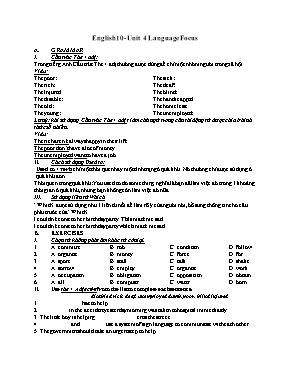Ngữ pháp và bài tập Unit 4 môn Tiếng Anh 10
Bạn đang xem tài liệu "Ngữ pháp và bài tập Unit 4 môn Tiếng Anh 10", để tải tài liệu gốc về máy bạn click vào nút DOWNLOAD ở trên

English 10- Unit 4 Language Focus GRAMMAR Cấu trúc The + adj: Trong tiếng Anh Cấu trúc The + adj thường được dùng để chỉ một nhóm người trong xã hội. Ví dụ: The poor: The rich: The Injured The disable: The old: The young: The sick: The deaf: The blind: The handicapped The homeless: The unemployed: Lưu ý: khi sử dụng Cấu trúc The + adj t làm chủ ngữ trong câu thì động từ được chia ở hình thức số nhiều. Ví dụ: The rich aren’t always happy in their life. The poor don’t have a lot of money The unemployed want to have a job Cách sử dụng Used to: Used to + verb chỉ một thói quen hay một tình trạng ở quá khứ. Nó thường chỉ được sử dụng ở quá khứ đơn. Thói quen trong quá khứ: You used to do something, nghĩa là bạn đã làm việc đó trong 1 khoảng thời gian ở quá khứ, nhưng bạn không còn làm việc đó nữa. Sử dụng liên từ Which “Which” được sử dụng như 1 liên từ nối để làm rõ ý của người nói, bổ sung thông tin cho câu phái trước của “Which”. I couldn’t come to her birthday party. This made me sad. I couldn’t come to her birthday party which made me sad. EXERCISES Chọn từ không phát âm khác từ còn lại. A. commune B. rob C. condition D. follow A. organize B. money C. force D. for A. sport B. stall C. talk D. shake A. sorrow B. employ C. organize D. work A. occupation B. obligation C. opposition D. obtain A. all B. computer C. water D. born II. Use the + Adjective from the list to complete each sentence. disabled, rich, deaf, unemployed, dumb, poor, blind, injured 1. have to help 2. in the accident yesterday morning was taken to hospital immediately. 3. The little boy is helping cross the street. 4. ......... and . use a system of sign language to communicate with each other. 5. The government should take an urgent step to help .. . 6. Don’t make fun of III. Choose the correct word between brackets. 1. The rich (is / are ) .. not always happy. 2. The poor (is / are )not always unhappy. 3. The dead never .( return / returns ). 4. The lazy can never .( succeeds / succeed ). 5. The young ( have / has ) the future in their hand. IV. Viết lại câu, sử dụng used to hoặc didn't use to 1. I had a lot of money but I lost it all when my business failed. I 2. I quite like classical music now, although I wasn't keen on it when I was younger. I 3. Dennis gave up smoking three years ago. Dennis 6. My parents lived in the USA when they were young. My parents 7. Jim was my best friend, but we aren't friends any more. Jim 8. When he was younger, my uncle was a national swimming champion. My uncle 9. I didn’t eat ice-cream when I was a child. I 10. When Barbara was in Italy, she stayed with an Italian family Barbara________________________________________________ 11. I didn't drink coffee when I was younger. I _____________________________________________________ 12. I went to the church when I was a child. I______________________________________________________ 13. Mr. Michael grew tulips but he doesn't any more. Mr. Micheal____________________________________________ 14. I didn't listen to classical music when I was young I _____________________________________________________ 15. I played football with my friends when I was a student I_____________________________________________________ V. Use “WHICH” to combine each pair of sentences. 1. John is always late for class. This annoys the teacher. 3. He passed the exam with high grades. This made everybody in the family pleased. 4. We have lost her phone number. This makes it difficult to contact her. 5. Jane couldn’t come to my birthday party. This made me feel sad. 6. She has promised herself to be on time to work everyday. That is a good idea. 7. Tim has found a new job. That is lucky. 8. She usually comes to work on time. That pleases her boss. 9. A dictionary is a book. This gives you the meaning of words.
Tài liệu đính kèm:
 ngu_phap_va_bai_tap_unit_4_mon_tieng_anh_10.docx
ngu_phap_va_bai_tap_unit_4_mon_tieng_anh_10.docx





